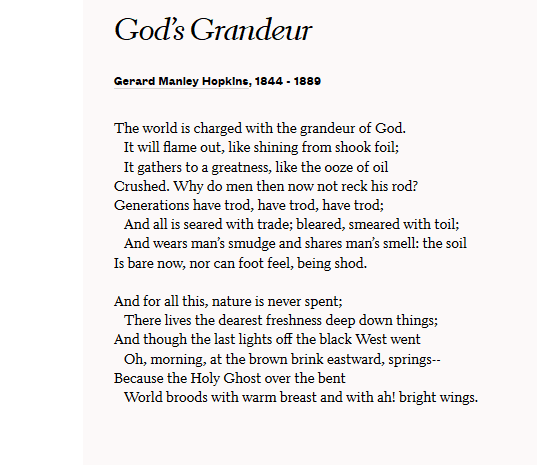Lines 7-8 of Gerard Manley Hopkins' "God's Grandeur" Reads: ..."the Soil/is Bare" Because _______.
Andrew has a smashing interest in all aspects of poetry and writes extensively on the discipline. His poems are published online and in impress.

Gerard Manley Hopkins
Gerard Manley Hopkins And A Summary of God's Grandeur
God's Grandeur is a finely crafted sonnet written in 1877, the year Hopkins was ordained as a Jesuit priest. It explores the relationship between God and the earth of nature, how the divine is infused in things and refreshes, despite the efforts of humans to ruin the whole show.
With the industrial and commercial revolutions gathering stride in Britain and the Due west, unprecedented pressures were beingness placed on the environment. Hopkins, a sensitive and observant poet above all else, expressed his dismay at this free-for-all by writing sonnets of boggling texture and depth.
God'due south Grandeur is a tour de force, tight-knit yet organic in rhythm and internal rhyme. Hopkins was a captious and seriously experimental poet, working his lines metrically once more and again to attain the desired effect.

God's Grandeur
Farther Analysis Line By Line of God'south Grandeur
Lines 1 - 4
The title word grandeur, from the French, means greatness, grandness, and it occurs in the opening ten syllable line, the speaker declaring that the world is electrified by this impressive divinely given impulse.
Hopkins, always a finely tuned poet in his selection of words, deliberately uses charged to bring an instant surge of positive energy into the reader's mind. Images of lightning flashes across a skyscape, of sparks being created, of invisible oomph coursing through everything, everywhere.
Note the mild alliteration too - globe/with and grandeur/God - in a line that is cease stopped for emphasis.
The second line now consolidates this opening statement by introducing all the same more vivid imagery, enhancing the thought of electricity, ability, oestrus and forcefulness. Merely, Hopkins beingness Hopkins, he takes the reader deep into the image with a vivid specific detail. This is no ordinary flame simply one that resembles foil when it is shaken.
Hopkins himself wrote in a letter:
'I mean foil in its sense of leaf or tinsel, and no other word whatever will give the effect I desire. Shaken gilded-foil gives off broad glares similar sheet lightning and also, and this is true of aught else, owing to its zigzag dints and crossings and network of small many cornered facets, a sort of fork lightning too.'
Spondee and iamb, together with a caesura (pause midway along the line, because of the comma), contribute to the altered rhythm. Assonance and ingemination are once more in evidence - shining/shook and shook/foil, calculation to the texture.
Line three continues with a 2nd case. Not just is in that location a flame bursting out, there is a gathering, a liquified magnificence, equally when say fruits or vegetables are crushed for their oil.
- This is a twelve syllable line, to accept in the spread of the oil, extending the beat which is counterpoint to the set iambic tradition. The sounds stretch and roll around the mouth and non only that, enjambment takes the reader into the fourth line, where the unmarried give-and-take Crushed is suddenly end-stopped.
Read More From Owlcation
This abrupt punctuation causes the reader to restriction before entering the sonnet's mini turn in the form of the ane and merely question, concerning the attitude of human being towards God. Single syllables are stark reminders of this puzzling situation - man ignores the crawly energy of God.
The term reck his rod ways to not take intendance of, or not pay heed to, (reckless) God'south instrument of ability, something like a lightning rod.
Lines 5 - 8
The next iv lines are in some means an answer to the question. Men (humans) pay no attending to God'southward grandeur because they've become creatures of commerce and devastation.
Line 5 is most unusual. Full of iambs, it repeats the take trod to reinforce the idea of mankind treading all over the globe, ruining it as they get most their concern.
Line 6 continues the theme of nature existence despoiled past the behaviour of humans. Note the 3 words seared/bleared/smeared, all negative, reflecting the harm done through manufacture and the race for profit.
The obvious interconnectedness of internal rhyme, the mixed rhythm at odds with the regular iambic trounce, create an ebb and period that disrupts, leaving the reader uncertain as to where the next line will accept them.
Line seven reinforces line six - anaphora is used, repeated utilize of words (And) - humans cannot assistance only stain and marking out their territories, - iambic beats returning, alliteration very strong smudge/shares/olfactory property/soil as enjambment one time again continues the sense into line eight.
Line eight reaffirms that once industrialised humans accept got their concur on nature, not much good tin can come out of the globe. The soil is blank and the many feet that take trammeled have no feeling left - they're shod, like horses are shod.
So, the speaker has given the reader a clear picture of the world. God's great positive energy flows throughout, energising, invigorating, whilst humankind is busy polluting and undermining.
More than Analysis Line by Line
Lines 9 - fourteen
The sestet brings a dissimilar arroyo, a conclusion to what has gone before in the octave. Despite all of humankind's efforts to ruin the natural world, it, nature through God, resists and refreshes itself.
Line nine is perhaps the most straightforward in the whole sonnet - no matter what man throws at nature, it is never completely smashed; it comes dorsum, it ever returns. Ten syllables, iambs, no messing. Note that Hopkins alliterates once again - nature/never. He tin't help it.
Line ten is perhaps one of the most well known. It contains the mysterious notwithstanding intriguing love freshness deep down things an alliterative phrase that is a delight to read and complex to ponder on.
Invisible to the naked heart, this dearest freshness is a spiritual energy that today gets the ecologists, religionists and environmental people excited - information technology is present in all things and especially apparent when each new day dawns, as lines eleven and twelve propose.
Line twelve with spondees and astute use of punctuation, is poised beautifully.
As the sun rises, the speaker acknowledges the presence of the christian Holy Ghost, the active strength of God, without flesh or known body, third fellow member of the Godhead.
Lines thirteen and fourteen item this final image, that of a bird-like entity protecting and warming the nest (and nestlings) that is the earth.
The last line is typical Hopkins - ingemination earth/with/warm/wings and broods/chest/vivid providing a wealth of sound carried on varied sprung rhythm. Globe'due south renewal is guaranteed and no amount of smudge and smell can thwart this mystical process.
Rhyme, Literary/Poetic Devices - Analysis of God's Grandeur
God's Grandeur is an Italian or Petrarchan sonnet, being split into an octave (8 lines) and a sestet (6 lines). The octave and sestet are end rhymed and the rhyme scheme is: abbaabba cdcdcd.
Traditionally the octave is a proposal or introduction, of an argument or idea, and the sestet and so becomes the development of, or determination to, the octave. This shift in sense is known every bit the plough or volta (in Italian).
- Hopkins sticks to these traditions of rhyme and form, just where he differs is in his choice of language, subject and metre (meter in United states of america).
Subject
Sonnets are usually all most love and romance and relationships betwixt people, lovers and so forth. God's Grandeur focuses on the handiwork of God, the natural phenomena he inherently resides within, and the contrasting negative influences of human.
Language/Diction
As you read through, make a mental note of words like charged and flame out, related to electricity and the element of fire respectively. What about shining from shook foil and ooze of oil/Crushed - both short and long vowels used to enhance the image of brilliance and smoothness, whilst the consonants echo.
The contrast between positive and negative language is stark. Just consider reck/trod/seared/bleared/smeared/toil/smudge/smell/blank....in the octave, reflecting man'due south destructive influence on the world.
And so take charged/grandeur/flame out/ greatness/never spent/dearest freshness/with warm chest/vivid wings...from both octave and sestet, implying that God and nature piece of work well together.
Metre (Meter in American English language)
Hopkins is well known for experimenting with his metrical systems. He preferred to mix things up and not stick to the regular daDUM x5 vanquish of the iambic pentameter.
God'due south Grandeur is packed with deviations, such as the spondaic shook foil of line three and Crushed.Why of line 4.
Note the 12 syllables of line three, adding two to the usual ten syllables per line to reflect the result of the oil.
An unusual repeated iambic beat occurs in line five where have trod, have trod, have trod enhances the idea of many feet plodding.
Sources
The Poetry Handbook, John Lennard, OUP,2005
www.poetryfoundation.org
www.bl.uk
© 2017 Andrew Spacey
Source: https://owlcation.com/humanities/Analysis-of-Poem-Gods-Grandeur-by-Gerard-Manley-Hopkins
0 Response to "Lines 7-8 of Gerard Manley Hopkins' "God's Grandeur" Reads: ..."the Soil/is Bare" Because _______."
Post a Comment